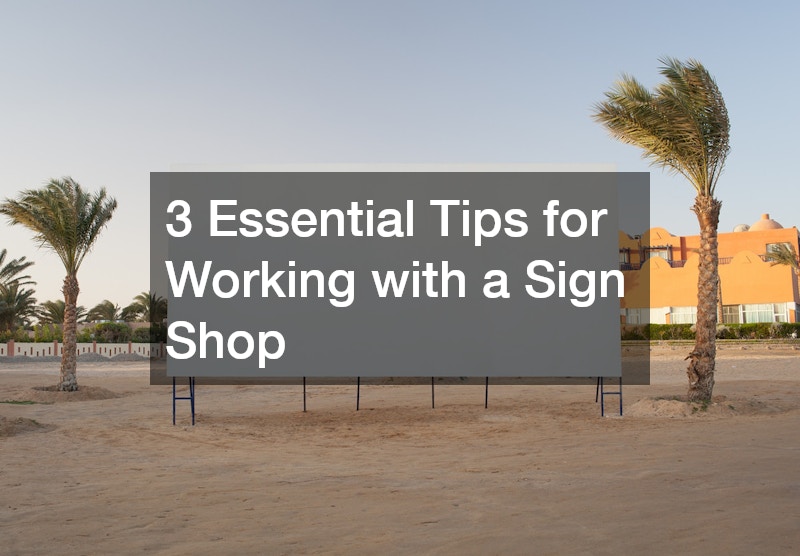3 Essential Tips for Working with a Sign Shop
Creating high-quality signage is an important part of any business’s branding and communication strategy. Whether you need shopfront signage, promotional banners or vehicle wraps, professional sign shops can help bring your vision to life. However, achieving the best results involves more than just placing an order.
To ensure your signage meets your expectations and serves its purpose effectively, it’s crucial to work collaboratively and strategically with your chosen provider. Here are three essential tips to help you get the most from your experience.
1. Clarify Your Goals and Brand Identity
Before you approach a sign shop, it’s important to be clear about your business goals and how your signage fits into your broader brand strategy. A good sign doesn’t just tell people where you are, it communicates what your business stands for. Think about the message you want to convey and how you want potential customers to feel when they see your signage.
Start by reviewing your brand elements such as your logo, colour palette, fonts and tone of voice. Your signage should align with these elements to maintain consistency across all customer touchpoints. If your branding is still in development or needs refinement, discuss this early with sign shops. Many offer design consultation services or can recommend a designer to help with layout and branding.
Consider where the sign will be located and who the intended audience is. A sign on a busy street may need bold lettering and high contrast to catch attention quickly, while interior signs might be more detailed or decorative. Thinking through these practical details in advance will help guide the design and production process and ensure your final product is both attractive and effective.
2. Communicate Clearly Throughout the Process
Successful signage projects rely on open and consistent communication between the client and the sign shop. After your initial consultation, maintain clear lines of contact to track progress, approve designs and address any issues that arise. Provide detailed instructions when necessary, and don’t assume the supplier will know exactly what you want without guidance.
Once you receive the first round of design proofs, take the time to review them carefully. Check for accuracy in spelling, layout, colours and overall alignment with your brand. It’s much easier to make changes during the design phase than after production begins. Be honest and constructive with your feedback to avoid miscommunications and delays with sign shops.
Ask questions if you’re unsure about anything. Whether it’s about materials, durability or installation requirements, a reputable sign shop will be happy to explain the process and provide recommendations. Remember that they work with many different types of signage and can often suggest improvements you might not have considered.
Establish timelines early in the process and confirm delivery or installation dates in writing. If the signage is linked to a specific event or deadline, allow extra time to account for potential setbacks such as weather delays or last-minute design changes. Clear scheduling and documentation help prevent misunderstandings and keep the project on track.
3. Understand Your Material and Installation Options
There is a wide range of materials and finishes available when it comes to signage, each with its advantages, costs and maintenance requirements. Choosing the right material for your specific needs is essential to ensure the signage performs well in its environment and maintains its appearance over time.
For outdoor signage, durability is key. Materials like aluminium composite panels, acrylic or UV-resistant vinyl are common choices because they can withstand the elements. If you’re looking for indoor signs, consider lighter or more decorative options such as foam boards or laser-cut wood. Talk to the sign shop about what materials are best suited for your location and budget.
Installation is another important factor that is sometimes overlooked. Some signage can be installed easily using adhesive or brackets, while others may require professional mounting or electrical work. Be sure to ask what is included in the service some sign shops offer full installation, while others may outsource this step or expect you to handle it separately.
It’s also worth considering ongoing maintenance. Illuminated signs, for instance, may need bulb replacements or electrical checks over time. Vinyl signage may eventually peel or fade, depending on its exposure to sunlight or weather. Ask about warranties or maintenance packages that may be available and clarify what kind of upkeep will be required to keep your signage looking its best.
Working with a sign shop is a valuable investment in your business’s visibility and branding. By taking the time to clarify your goals, communicate openly throughout the process and make informed choices about materials and installation, you can ensure that the result is both functional and visually appealing. Be honest and constructive with your feedback to avoid miscommunications and delays with sign shops. High-quality signage is more than a business necessity; it’s a powerful marketing tool that can attract customers, convey professionalism and strengthen your brand presence in any environment. With careful planning and a collaborative approach, your signage can deliver a lasting impact for years to come.
.




Post Comment